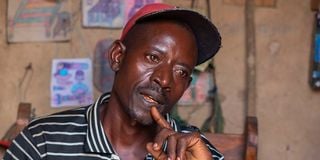Premium
Alone in death: I did not know my sister’s body lay unclaimed at City Mortuary

Josphat Kioko Mwangangi, brother to Agnes Mwangangi, whose body is lying at Mama Lucy Kibaki Hospital Mortuary, during the interview at his home in Matangini, Machakos County on February 9, 2023
The last time Agnes Mwangangi’s younger brother heard from her was in May 2022. While he cannot recall the details of the phone call, he remembers that it was a brief hearty conversation; a catching-up and a health status update.
They had hardly finished exchanging pleasantries when the airtime ran out. He never heard from her again.
It is through the phone that they kept tabs on one another, except that Agnes never owned one. Whenever she could, she beeped at the brother, Josphat Mwangangi, using a friend’s phone and the brother would call back.
Now, Agnes’ body is among hundreds listed by the Nairobi City Council as unclaimed. The body has been lying at the Mama Lucy Kibaki Hospital Mortuary for several months. If the bodies stay unclaimed for a long time, the county seeks a court order to dispose of them.
There are no official statistics on how many unclaimed bodies are buried across Kenya. A Nation investigation that involved interviews and travelling to the rural homes where the dead hailed from to break the news of their deaths to relatives, found that every year, many end up like this since their relatives do not know they died.
Mr Mwangangi, is a cobbler. Phone airtime is a luxury. And when he had some, it was barely enough to exhaust the stories he shared with Agnes. Around February last year, Agnes was involved in a road accident in Nairobi and sustained severe injuries to her spinal cord. She opted to be treated closer home, at Matuu Level 4 hospital, under the care of her brother.
But when she felt better, she left home for Nairobi to accomplish two missions: lodge a lawsuit against the driver of the vehicle that maimed her, and seek specialised health care. She hoped that someday, she would walk back home in good health, but that was not to be.
When they last spoke, she was in pain, the brother said. He could tell from her tone, but her voice, he recalls, exuded hope.
“We had an unbreakable bond,” Mr Mwangangi narrates.
They hailed from a middle-class family, but the deaths of their parents made their situation at home bad. Their parents were the fabric that held their family together. When they died, the family disintegrated.
Agnes was the second-born of seven siblings. In the capital, she worked in a hair salon. She was a loving and caring sister who longed to weave back together her disintegrated family.
As he speaks, Mr Mwangangi struggles to maintain his train of thought. In the two hours of the interview, he breaks down severally, pausing at intervals, his eyes welling up.
“I’m so heartbroken to hear of my sister’s death,” he says amid pauses to reflect. “How did she find herself at the mortuary?”
Unidentified bodies
Unclaimed bodies are distinct from unidentified bodies. Often, quite a bit of information is known about the unclaimed and local officials should be able to track down relatives. The Nation obtained the details from the National Registration Bureau and traced where some, like Agnes, hailed from. It took only 24 hours to get to Josphat.
The drive to Matangini village, where the Mwangangis hail from, lasted two hours. It is 94km from Nairobi.
Josphat opens a storage bag of things left behind by his sister that offers a glimpse into her life: tens of X-ray negatives, a copy of her ID, and some clothes. These are the only things she left behind.
“I would want my sister to be buried next to my parents, but if there are any unpaid bills at the mortuary, how will I sort them out from my meagre income?” a worried Josphat says, pointing at the shack he lives in, which is the only property he owns.
Tomorrow: Read about the family from Laikipia which insists that they buried their kin last year, while City Mortuary says they still have the body. Did they bury the wrong body?





